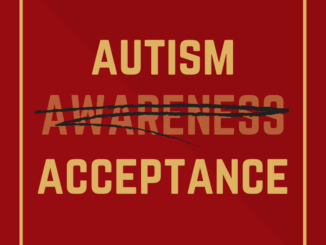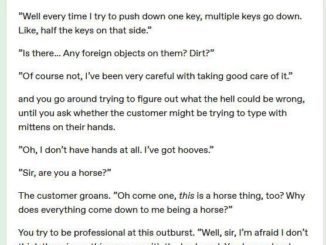“I want you to build a tower,” I say.
You agree, and you stand up to go get the bucket of blocks off the shelf.
I shake my head sternly. “No. Did I tell you you could get up? Sit down. Build a tower.”
You look confused. You point over at the bucket of blocks. It’s five feet away and on a reachable shelf, but you don’t have it in front of you now.
I sigh at your limited comprehension abilities. I take out a piece of paper to help me make a visual, and I draw you a little stick figure chart. “Look. First, make a tower. Then, stand up and walk. See? You have to make the tower first.”
You gesture at me about the absurdity of the situation you’re in. Pointing your hands downward like, “make a tower out of what???”
I point at the visual chart again, slowing my voice down like you’re a baby. “First, tower. Then, get up.”
You sit there and stare at me, waiting for me to figure out that you literally can’t.
I take out some stickers. “Come on. Make a tower and I’ll put a smiley face on your chart for the day! Don’t you want a smiley face?”
You DO want a smiley face but you literally don’t have the tools for the job! You have nothing with which to make a tower. You start to get angry.
I point at all of the others in the room. They all have a bucket of blocks right in front of them, and they’re all making a tower. “All your friends expect you to make a tower. You are behaving in an unexpected way and it’s making us uncomfortable.”
Weighing your options, you finally decide to stand up anyway and make a mad dash for the shelf. Maybe you can grab the bucket of blocks before I catch you? Maybe you can cobble together a tower in the few seconds you’ll have? Maybe that will help me understand?
But once you’re on your feet I’m yelling at you. Then I’m holding you down. Then I’m fighting you, hurting you, punishing you, calling you pathological and aggressive and defiant. I write in my report that I did all the right things and you did all the wrong ones.
The next day, I ask you to make a tower.
You still don’t have any blocks.
***
Constantly, CONSTANTLY, adults in positions of power over children (school, home, extracurricular activities) demand that children do things that they’re told to do, and use as a bribe or take away as a punishment the very resource that the child would actually need in order to do the thing that they’re told to do.
This was written specifically about the fact that Autistic children’s special interests are often used as a bribe, or with a first/then system, like, “first do this work, then you can play with your cars for three minutes,” or, “first do what I’m telling you, then you can have a ‘sensory break’.” What this ignores is that those are LITERALLY the vehicle by which their brain BECOMES able to do the work. The special interest is joy, delight, interest — neurologically speaking, it’s dopamine. And dopamine is actually, physically required in order to be able to initiate a task, and in order to be able to access the higher thinking resources required to do the task. Or the sensory tool is LITERALLY meeting the sensory need and requirement in the human being’s body that needs to be met in order for them to be able to access the higher thinking skills required to focus and attend to what they’re trying to do. But these things get taken and used by therapists or “therapists” or teachers or parents as if they are a reward, a bribe, an afterthought.
The special interest or the sensory tool are the “standing up and walking” over to the blocks, in the analogy story above. But the adult keeps getting mad that the child is trying to stand up and walk.
The child is doing whatever it takes to move toward dopamine or toward having their sensory needs met. And the adult is getting mad about the thing they’re doing to move in that direction.
The analogy carries over into lots of other realms, too. Teachers take away recess — physical body movement — to punish kids for moving their bodies too much. They police children’s ability to talk to one another, the human innate social need to bounce ideas around with peers.
People are naturally, instinctually, really good at meeting their sensory needs. If they have a little extra energy or need a little extra proprioception in their legs and feet, they’ll bounce while they’re walking. If they are trying to keep their brain awake and moving in a slow-moving environment when they can feel themselves fading, they’ll reach out and fidget with something that’s in front of them. But watch a group of kids try to wiggle a little while they walk down a hallway or reach out and brush fingertips against something they’re walking past and as likely as not you’ll see an adult “correct” them (incorrectly, since telling them “stop it” does nothing to teach them how to channel it, only to suppress it til it explodes somewhere else).
The brain can’t even do the thing you’re asking it to do, without the resources it needs to do the thing. But kids start seeking out the resources, and get in trouble, and get hurt, and get punished, and the adults think, “I have done all the right things, and you have done all the wrong ones.”
The next day, the adult asks the child to get up and do it again.
And they still don’t have any “blocks”.



